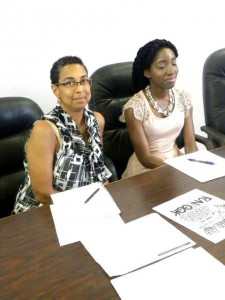By: St. Clair Sazam Hull
Nevispages.com
(CHARLESTOWN NEVIS)-The Ministry of Health in collaboration with the University of Virginia conducted a press conference on the morning of May 28, 2013 at the Administration Building, Charlestown. This was to highlight children suffering from asthma.

Permanent Secretary, in the Ministry of Health Mrs. Nicole Slack-Liburd chaired the event and gave the opening remarks. She noted that it was indeed a pleasure, for her department to collaborate with the University of Virginia in an effort to bring awareness of asthma to the citizens of Nevis. Mrs. Slack-Liburd indicated that particular concern was for children who suffer from the disease.
Mrs. Slack Liburd indicated that a survey would be carried out from Tuesday, May 27, 2013 and is scheduled to conclude on Friday, May 31, 2013 to determine the prevalence of asthma on the island. She was of the view that children with asthma could lead a normal life, once certain precautions are taken, with things such as second hand smoke.
Dr. Genita Richardson, a health educator at the University of Virginia gave some brief remarks. She thanked the Ministry for its invitation, and stated that asthma is a global problem that should be tackled by all concerned. Asthma, she said, is an experience of unpleasantness especially for children. She appealed to those with the diagnosis to come forward and seek help.
Dr. Richardson pointed out that it is extremely painful for parents to watch their children in pain or suffering from asthma and not knowing how to help them feel better. Asthma, she claimed, is a difficult condition for most adults and for children it is even worse because they may not even know how to help themselves. She said that parents whose children suffer from asthma need to educate themselves as much as they can about the condition. Once the parents understand in detail what they are dealing with they are in a better position to explain to the children the condition that asthma entails.

Ms. Seleena Moore, a student who currently attends the University also gave some remarks. She stated that it is very important to focus on the health of children and the world at large. The paradox of asthma is that although our understanding of its physiological features and the therapies available for treating the disease have increased significantly over the past two decades, the prevalence of asthma and the health care use associated with it, and the disruptions it causes to family and community life have not decreased substantially.
Ms. Moore noted that the facts suggest a need for interventions that would enable individuals, families and communities to manage asthma and its consequences effectively.
Medical Officer of Public Health, Nevis Dr. Judy Nisbett also spoke briefly at the conference. Dr. Nisbett stated that asthma has a genetic origin that one is born with and is passed down from generation to generation. She indicated that each type of asthma is unique and if one has asthma it is very imperative to keep track of the factors or triggers. With the tracking of these factors and triggers, one may be able to determine what provoke asthmatic episodes.
Dr. Nisbett pointed out that during normal breathing; the airways to the lungs are fully opened, allowing air to move in and out freely. People with asthma have inflamed super-sensitive airways. Their triggers cause the changes in the airway, which in turn causes asthmatic symptoms. Dr. Nisbett concluded that sometimes a child might just be coughing, but that is also a sign of being asthmatic.
